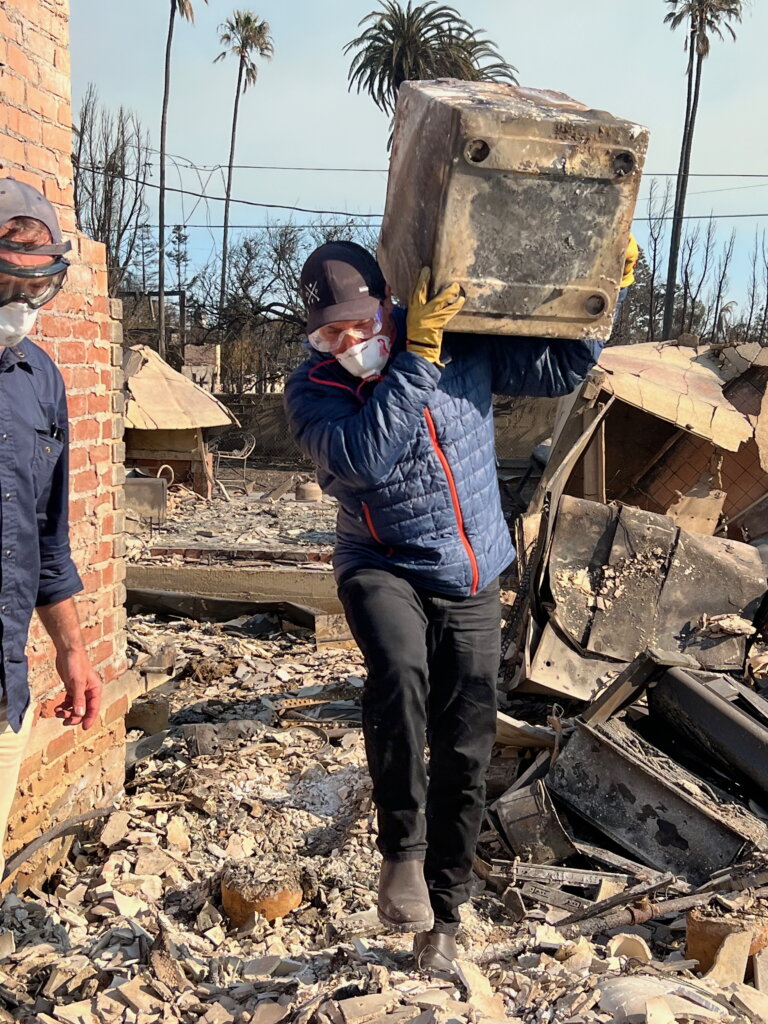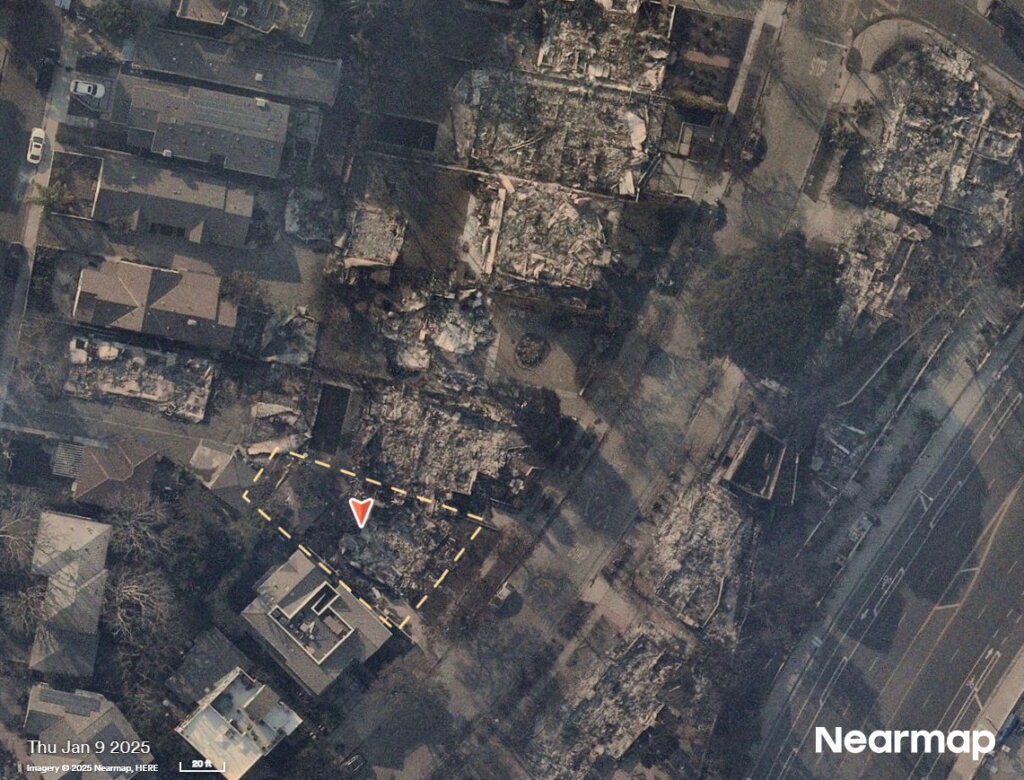Flames from the Palisades Fire burn in front of the Jewish Temple Chabad of Pacific Palisades on Jan. 7. Photo by Apu Gomes/Getty Images
When Judy Zweig discovered that a precious family heirloom was destroyed after her Pacific Palisades home of 30 years burned to the ground, she was wracked with guilt.
“I was the last one home,” she said, holding back tears. “I just walked away and left everything.”
Perhaps the most painful loss: a silver candelabra that her great-grandmother smuggled out of Russia.
“It sat on my grandmother’s table every day of her adult life,” Zweig, a dental hygienist, said during a phone call. “Then it sat on my mother’s table. It was my mother’s most cherished possession, and it lands in my hands, and I lose it.”
A community of friends swooped in to help. Families the Zweigs befriended when their now-adult children attended Jewish day school dropped meals and clothes off for the couple, who have been sleeping on the couch in their daughter Jenna’s apartment.
And when Zweig’s friend Cheryl Davidson heard about the candelabra, she brought Zweig three antique plates that belonged to her own grandmother.
“She said, ‘This may not be your family history, but it’s mine, and you can make new memories with them,’” Zweig said. “That was so incredible to me.”

The fires that have ravaged Los Angeles are not yet over. The Santa Ana winds that whipped the Palisades and Eaton fires out of control last week are expected to return Tuesday, bringing the risk of renewed blazes, even as more than 10,000 structures and 40,000 acres of land have already been consumed.
But the contour of the recovery is beginning to take shape, both through a powerful outpouring of selflessness and community spirit, and through the vile politicization that has come to infect every aspect of American life.
There are stages to how natural disasters ripple through society, said Rabbi Noah Farkas, CEO of the Los Angeles Jewish Federation, just like there are stages to mourning. First comes the heroic stage, when emergency workers do the impossible, restaurants offer free meals, and friends drop off clothes — or even, as in Zweig’s case, heirlooms.
Later will come a slower rebuilding stage. As a rabbinical student in the early 2000s, Farkas spent months as a volunteer in Biloxi, Mississippi, to aid in the recovery from Hurricane Katrina. “People need to adjust their expectations,” he said. “In Biloxi it took five years for this stuff to happen.”
The LA Federation has already raised more than $1 million dollars for fire victims, Farkas said, which it is distributing through its wildfire emergency response network. Jewish Family Services has stepped in with mental health counseling. Jewish Free Loan Los Angeles is offering aid to Jews and non-Jews, as is Bet Tzedek Legal Services, providing free legal help for renters and homeowners now facing a thicket of paperwork as federal and state agencies coordinate and begin rebuilding.
But after this initial flurry of effort, the road ahead will be long.
Los Angeles County has more Jews than any other U.S. county, according to the 2024 Jewish Year Book, and the fires cut a swath through the West L.A., Encino, Calabasas and Pasadena neighborhoods where, Farkas estimated, about 40% of LA’s 560,000 Jews live. They have leveled synagogues and stripped congregants of their homes.
After his home was destroyed in the Palisades Fire, Jonathan Zasloff, a professor of law at UCLA and an ordained rabbi, took to Facebook with an unusual declaration.
“I am a lucky man,” he wrote, listing the blessings he has found in the aftermath: supportive family and friends, a profession, good insurance, and a caring community.

“This is when it’s good to be Jewish,” Zasloff said in a phone call. “Because, you know, the rabbis didn’t do everything well, but they did disaster pretty well.”
What Zasloff is concerned about is what happens after the outpouring of altruism — including rebuilding decisions that may favor wealthier neighborhoods and homeowners, leaving renters and lower-income victims to struggle.
That’s when, Farkas said, the disillusionment phase begins — when people stop coming around to offer aid, media attention turns elsewhere, and partisan bickering begins.
During the disillusionment phase in Biloxi, for instance, some people decided flood victims whose homes were destroyed by mold must have crossed God — delivering a serious blow to post-disaster unity.
Preserving that unity in LA will be crucial for the success of long-term relief efforts, Farkas said: “This is not a Jewish fire. It’s an Angeleno fire.”
It won’t be easy. President-elect Donald Trump, instead of comforting the victims, has launched a series of attacks on California’s Democratic leaders, blaming them for the fires’ devastation. The New Republic reported that Republican senators threatened, vaguely, to condition aid to California on changes to its liberal policies — expect the letters “DEI” to be part of every congressional debate on aid — and Speaker of the House Mike Johnson said aid may be conditioned in response to concerns that LA’s “state and local leaders were derelict in their duty in many respects.”
Elon Musk, a powerful Trump ally, pumped more gasoline onto the fire of misinformation, blaming, of course, DEI and left-caused water shortages. But Greg Pierce, a water-resource scholar at UCLA, told CNN, “I don’t know a water system in the world that is that prepared for this type of event.”
It’s inarguable that California needs to adopt smarter policies. The fires’ destruction was made worse by decades of bipartisan shortsightedness, including through insufficient fire-mitigation mandates on older homes. And LA’s Democratic mayor, Karen Bass, will have to answer to voters for her less-than-galvanizing response. But these partisan, divisive voices are toxic to recovery efforts, focused as they are on laying blame, not moving forward.
“We can’t even have a rational political conversation about our problems,” said Zasloff.
Zasloff said it’s hard to believe that only a week ago he was eating breakfast at the popular Noah’s Bagels in the Palisades when he saw a smoke plume, and raced back to his house, grabbing some documents and leaving behind, like Zweig, a pair of heirloom candlesticks, his made from brass.
He doesn’t know if they survived, but a neighbor told him that, oddly, two plastic trash bins in front of his driveway did emerge from the inferno unscathed.
“If it turns out the heirloom brass candlesticks melted down, and only the bins survived,” Zasloff said, “that is a great metaphor for our culture.”

I hope you appreciated this article. Before you go, I’d like to ask you to please support the Forward’s award-winning, nonprofit journalism so that we can be prepared for whatever news 2025 brings.
At a time when other newsrooms are closing or cutting back, the Forward has removed its paywall and invested additional resources to report on the ground from Israel and around the U.S. on the impact of the war, rising antisemitism and polarized discourse.
Readers like you make it all possible. Support our work by becoming a Forward Member and connect with our journalism and your community.
— Rachel Fishman Feddersen, Publisher and CEO

